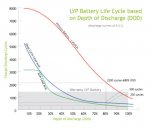- Joined
- Dec 31, 2016
- Messages
- 11,375
- Reaction score
- 2,650
- Gender
- Male
- Political Leaning
- Independent
Tesla also developing a one million miles battery.
"Last April, Elon Musk promised that Tesla would soon be able to power its electric cars for more than 1 million miles over the course of their lifespan. At the time, the claim seemed a bit much. That’s more than double the mileage Tesla owners can expect to get out of their car’s current battery packs, which are already well beyond the operational range of most other EV batteries. It just didn’t seem real—except now it appears that it is.
Earlier this month, a group of battery researchers at Dalhousie University, which has an exclusive agreement with Tesla, published a paper in The Journal of the Electrochemical Society describing a lithium-ion battery that “should be able to power an electric vehicle for over 1 million miles” while losing less than 10 percent of its energy capacity during its lifetime.
Led by physicist Jeff Dahn, one of the world’s foremost lithium-ion researchers, the Dalhousie group showed that its battery significantly outperforms any similar lithium-ion battery previously reported. They noted their battery could be especially useful for self-driving robotaxis and long-haul electric trucks, two products Tesla is developing."
Tesla May Soon Have a Battery That Can Last a Million Miles | WIRED
This will be the straw that broke the fossil fuel industry's back. If this comes to fruition, say goodbye to gasoline powered vehicles. Already Li-Ion batteries are good for 3000-4000 charge cycles. Putting that in perspective, even if somebody charged everyday (very-very unlikely), they would get over 10 years of operation.

